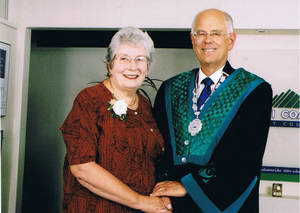Conrad – 9/10/97
The vote for a change of electoral system to MMP in 1995 was fuelled as much as anything by public disillusionment with politicians, and frustration at the difficulty in having any impact on Government policy. We have limited options when it comes to expressing this: we can sign petitions, we can march in the streets, and we can vote, once every three years.
Up until the last few years signing a petition was about as effective as trying to stop the aging process with plastic surgery. With the recently introduced Citizens Initiated Referenda the signing of petitions has been given a goal, to reach the 240,000 mark. At that point the Government could call for a referendum on the issue. Of course it is a non-binding referendum so they could ignore the results anyway.
The two most supported petitions in recent times were one to stop the Government from decreasing the numbers of firefighters and another earlier this year to stop them from spending $96 million on a new parliament building. In both cases the Government was forced to acknowledge public opinion.
However the net result has been that they have simply looked for another way to do the same thing. In the case of the firefighters they have reduced costs by slashing funding to such an extent that staff have felt their ability to do their job properly has been undermined, with morale now at an all time low. The most recent move has been the suggestion that they reduce their services to ‘core services’ meaning only fire fighting. One firefighter in Dunedin has sent back his award for bravery in the rescue of a small boy, because that rescue would not be performed under a core services only regime.
In the case of the new parliamentary building they came up with a more expensive option, that of shifting the Beehive, proving that they really haven’t understood the anger of the public over the spending of tax dollars on themselves when other areas, like health and education (and firefighting) , are so financially starved.
Marching on the streets, often felt to be our last hope of publicly demonstrating our feelings on an issue, is at best ignored, apart from the opposition who can score political points, and at worst scorned. The recent student protests outside Parliament were dismissed by the Prime Minister Jim Bolger as a “rent-a-mob”.
Lockwood Smith, as Education Minister, once made himself most unpopular with his ‘let them eat cake’ approach to protesters. A large number of teachers and education workers had marched through Wellington to Parliament where they demanded he come down and talk to them. His comment to the media was that he wouldn’t, as a matter of principle, talk to a rabble that used this method (marching in the streets) of expressing their views. Never mind that they were so frustrated with him they felt that this was the only option left to make him take notice.
Then there are elections. The candidates and parties tell us their policies and we cast our votes accordingly. The party that ends up governing then has a mandate to put into practice those policies because more people voted for them than any others. Some of the public anger that led to the change to MMP was fuelled by the 1984-1992 Labour Government’s privatisation agenda that was not part of their election platform and they therefore had no mandate to pursue.
The most recent election (our first under MMP) produced a result where there was a big swing to New Zealand First, mainly in support of their pre-election policies which included ruling out any deal with National, increasing funding for Health, and a stop to privatisation of Government assets. After the election political expediency took over and they joined in a coalition with National.
The Coalition Agreement necessitated a watering down of both parties’ policies much to the disillusionment of many NZ First supporters. Quite aside from the ‘sideshows’ of Tuku, the actual policy impact of having NZ First in Coalition Government has been negligible. The one NZ First minister to actually try and implement policy, Neil Kirton in the area of Health, has been sacked, for reasons far less serious than for which Tuku remained in spite of. This has left National in the driving seat of Health and no further signs of NZ First policy influence.
Last week Jim Bolger, in a move to shore up his personal support as Prime Minister and also the National Party’s traditional right-of-centre support, made a speech in which he said two notable things. Firstly he raised the idea of the privatisation of TVNZ. This is not only against NZ First pre-election policy, but contravenes a clause in the Coalition Agreement which specifically prohibits this. Secondly he said that he doesn’t think the Coalition Agreement should be a ‘straitjacket’. This gives both parties a convenient way out. There has been little response from Winston Peters.
So this means that not only is pre-election party policy expendable in the fight for power, but the agreement on policy which the coalition uses as a blueprint to govern (despite, incidentally, not having been voted for directly by the public), isn’t worth the paper it’s written on as it can be broken with the acquiescence of both parties.
The reason? Political survival. It’s just a pity they don’t seem to realize that the methods they are using to survive are the very reasons why they are so rapidly losing support.

